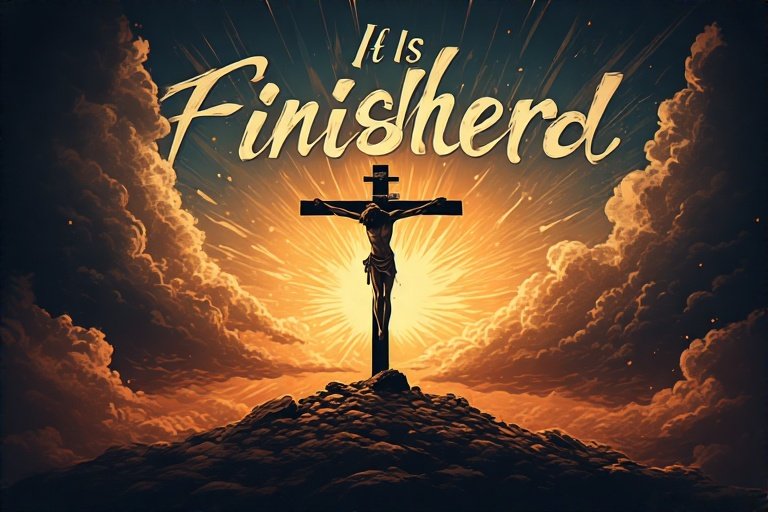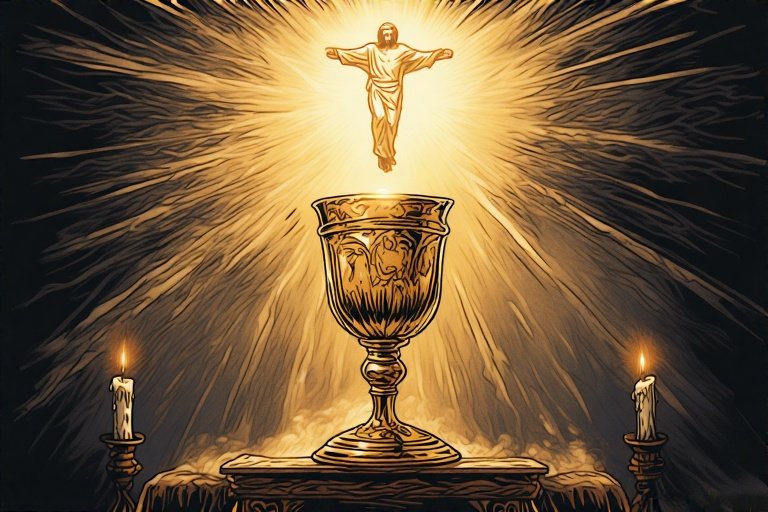🕊️ Which Churches Believe in Transubstantiation?
While having a Biblical discussion with @jongolson, as usual, it primarily centers around that the first 1,500 years of Christians considering the Old Covenant completed when Jesus died on the cross and the Eucharist.

✝️ “It Is Finished” — What Did Jesus Mean?
“When Jesus had received the sour wine, He said, ‘It is finished,’ and He bowed His head and gave up His spirit.”
— John 19:30 (ESV)
One of the most powerful statements ever spoken came from the cross. When Jesus said, “It is finished,” He wasn’t declaring defeat — He was proclaiming total victory.
The original Greek word used is tetelestai (τετέλεσται), which means:
✅ Paid in full
✅ Debt settled
✅ Mission accomplished
Let’s break down what this means spiritually, prophetically, and personally:
🩸 1. The Work of Redemption Is Complete
Christ’s death satisfied the justice of God. The penalty for sin was paid in full.
“But He was pierced for our transgressions... and by His wounds we are healed.”
— Isaiah 53:5
📜 2. The Old Covenant Is Fulfilled
The temple sacrifices, the Mosaic Law, and the prophecies — all pointed to this moment. Jesus fulfilled it perfectly.
“We have been made holy through the sacrifice of the body of Jesus Christ once for all.”
— Hebrews 10:10
🔮 3. Prophecies Were Fulfilled
Jesus completed everything written about the Messiah — His suffering, betrayal, and crucifixion.
“Everything must be fulfilled that is written about me in the Law of Moses, the Prophets and the Psalms.”
— Luke 24:44
🛡 4. Satan’s Power Is Broken
The cross wasn’t a loss — it was a public victory over the powers of darkness.
“Having disarmed the powers and authorities, He made a public spectacle of them, triumphing over them by the cross.”
— Colossians 2:15
🕊 5. Access to God Is Opened
At the moment Jesus died, the temple veil was torn. That wasn’t just symbolism — it was revolution. We now have direct access to the Father.
“Let us then approach God’s throne of grace with confidence…”
— Hebrews 4:16
🙌 The Final Word
When Jesus said, “It is finished,” He wasn’t giving up — He was declaring victory.
The mission was complete.
The sacrifice was made.
The curse was broken.
The King had triumphed.
John 6: 48-68 Jesus Loses Many Followers, Why?
53 Jesus said to them, “Amen, amen, I say to you, unless you eat the flesh of the Son of Man and drink his blood, you do not have life within you.

What Does It Mean When Jesus Says "Amen, Amen"?
When Jesus says “Amen, Amen” before speaking (often rendered in English as “Truly, truly” or “Verily, verily”), it’s a strong way of emphasizing the absolute truth and authority of what He’s about to say.
1. “Amen” means “truth” or “so be it.”
In Hebrew, amen (אָמֵן) conveys agreement, certainty, or affirmation. It's often said at the end of prayers or declarations—like saying, “Yes, that’s true” or “I agree.”
But Jesus does something different...
2. Jesus says “Amen” before the statement—twice.
This was unusual. Rabbis might say amen in response to others, but Jesus begins with it, essentially saying:
“What I’m about to say is not only true — it’s authoritative, final, and from God Himself.”
When He doubles it — “Amen, amen” — He’s driving the point even harder, like saying:
“Listen carefully. This is ultimate truth.”
3. It highlights His divine authority.
No prophet or rabbi before Him spoke like this. Jesus isn’t quoting another authority; He is the authority. It’s His way of saying, “I speak with the authority of God.”
🔍 Examples in Scripture:
John 3:3 — "Amen, amen, I say to you, unless one is born again, he cannot see the kingdom of God.”
John 5:24 — "Amen, amen, I say to you, whoever hears my word and believes him who sent me has eternal life.”
These statements are not open to debate—they're divine declarations.
TL;DR:
When Jesus says “Amen, amen”, He’s saying:
“What I’m about to tell you is absolutely true and carries divine authority. Pay close attention.”
47 Amen, amen, I say to you, whoever believes has eternal life. 48 I am the bread of life. 49 Your ancestors ate the manna in the desert, but they died; 50 this is the bread that comes down from heaven so that one may eat it and not die. 51 I am the living bread that came down from heaven; whoever eats this bread will live forever; and the bread that I will give is my flesh for the life of the world.”
52 The Jews quarreled among themselves, saying, “How can this man give us [his] flesh to eat?” 53 Jesus said to them, “Amen, amen, I say to you, unless you eat the flesh of the Son of Man and drink his blood, you do not have life within you. 54 Whoever eats[s] my flesh and drinks my blood has eternal life, and I will raise him on the last day. 55 For my flesh is true food, and my blood is true drink. 56 Whoever eats my flesh and drinks my blood remains in me and I in him. 57 Just as the living Father sent me and I have life because of the Father, so also the one who feeds on me will have life because of me. 58 This is the bread that came down from heaven. Unlike your ancestors who ate and still died, whoever eats this bread will live forever.” 59 These things he said while teaching in the synagogue in Capernaum.
The Words of Eternal Life.[t] 60 Then many of his disciples who were listening said, “This saying is hard; who can accept it?” 61 Since Jesus knew that his disciples were murmuring about this, he said to them, “Does this shock you? 62 What if you were to see the Son of Man ascending to where he was before?[u] 63 It is the spirit that gives life, while the flesh[v] is of no avail. The words I have spoken to you are spirit and life. 64 But there are some of you who do not believe.” Jesus knew from the beginning the ones who would not believe and the one who would betray him. 65 And he said, “For this reason I have told you that no one can come to me unless it is granted him by my Father.”
66 As a result of this, many [of] his disciples returned to their former way of life and no longer accompanied him. 67 Jesus then said to the Twelve, “Do you also want to leave?” 68 Simon Peter answered him, “Master, to whom shall we go? You have the words of eternal life.
How Do We Eat The Body and Blood?
Transubstantiation is the belief that, during the Eucharist, the bread and wine become the actual Body and Blood of Jesus Christ, even though they still look and taste like bread and wine.
This belief is central to Catholic theology and is shared or reflected—though with different wording—in other ancient branches of Christianity.
Let’s break it down:
✅ Churches That Officially Believe in Transubstantiation
This is not something unique to Roman Catholics, it was all the churches for 1,500 years.
1. Roman Catholic Church
Defined at the Fourth Lateran Council (1215) and reaffirmed at the Council of Trent.
Catechism of the Catholic Church 1376 affirms it plainly.
Belief: The bread and wine truly become Christ’s Body and Blood during the consecration, through the Holy Spirit and the priest’s words.
2. Eastern Catholic Churches
In full communion with Rome, these include:
Maronite
Melkite Greek Catholic
Ukrainian Greek Catholic
Chaldean
Syro-Malabar
Coptic Catholic
They may use different expressions, but uphold the same belief in transubstantiation.
⚖️ Churches With Similar Beliefs (But Use Different Language)
These churches believe in the Real Presence of Christ in the Eucharist but reject the term "transubstantiation" due to different theological language or emphasis.
3. Eastern Orthodox Church
Belief: The Eucharist becomes the Body and Blood of Christ.
Preferred terms: Holy Mystery or metabole (“change” in Greek).
They avoid defining how the transformation happens and reject philosophical explanations like substance and accidents.
4. Oriental Orthodox Churches
Includes:
Coptic Orthodox
Syriac Orthodox
Armenian Apostolic
Ethiopian & Eritrean Orthodox
These churches affirm Christ’s Real Presence in the Eucharist but explain it mystically rather than philosophically.
5. Church of the East (Assyrian)
Holds to a real transformation of the Eucharistic elements.
Uses its own ancient terminology and Christological framework, but the belief is there.
❌ Churches That Reject Transubstantiation
These groups interpret the Lord’s Supper differently—symbolically or spiritually.
Lutherans: Believe in sacramental union—Christ is present with, in, and under the bread and wine—but reject transubstantiation.
Anglicans / Episcopalians: Vary widely. Some Anglo-Catholics hold similar views to Rome, but many see communion as symbolic.
Reformed / Presbyterians: Follow Calvin’s view of a spiritual presence, not a physical one.
Evangelicals / Baptists / Pentecostals / Adventists: Typically see the bread and wine as symbols only, not transformed.
📊 Summary Chart
Church Tradition | Belief in Transubstantiation? | Notes |
|---|---|---|
Roman Catholic | ✅ Yes | Official dogma |
Eastern Catholic | ✅ Yes | Same doctrine as Roman Catholic |
Eastern Orthodox | 🟡 Yes (different term) | “Holy Mystery,” no detailed explanation |
Oriental Orthodox | 🟡 Yes (different term) | Mystical transformation affirmed |
Church of the East | 🟡 Yes (different framework) | Real Presence, distinct theology |
Lutheran | ❌ No | Sacramental union instead |
Anglican / Episcopal | ❌ / 🟡 Varies | Depends on theological leaning |
Reformed / Presbyterian | ❌ No | Symbolic or spiritual only |
Evangelical / Baptist | ❌ No | Purely symbolic view |
💭 Final Thought
If you’ve only experienced the Eucharist as a symbolic act, the idea that Christ is truly present—Body, Blood, Soul, and Divinity—can feel radical. But for Catholics and many ancient Christian churches, this has always been the heart of Christian worship.
The Real Presence isn’t just poetic language. It’s a mystery rooted in Scripture, affirmed by the early Church, and still embraced today by the Universal Church.
Follow Me: https://blurt.blog/@grandpapulse (Blurt Is The Best App To Stack Crypto) https://x.com/GrandpaPulse (Crypto Twitter Is A Must) https://www.youtubecom/@GrandpaPulse
Want to know what the early Christians believed about the Eucharist? Look up St. Ignatius of Antioch (110 A.D.) and prepare to be surprised.